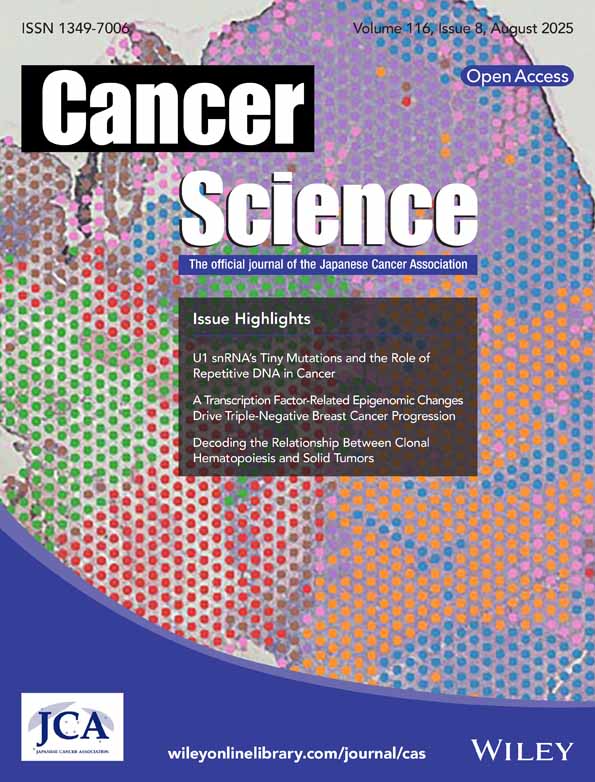Potentiation of Invasive Capacity of Rat Ascites Hepatoma Cells by Transforming Growth Factor-β
Mutsuko Mukai
Department of Tumor Biochemistry, Research Institute, The Center for Adult Diseases, Osaka, 1-3-3 Nakamichi, Higashinari-ku, Osaka 537
Search for more papers by this authorKiyoko Shinkai
Department of Tumor Biochemistry, Research Institute, The Center for Adult Diseases, Osaka, 1-3-3 Nakamichi, Higashinari-ku, Osaka 537
Search for more papers by this authorKeiko Komatsu
Department of Tumor Biochemistry, Research Institute, The Center for Adult Diseases, Osaka, 1-3-3 Nakamichi, Higashinari-ku, Osaka 537
Search for more papers by this authorHitoshi Akedo
Department of Tumor Biochemistry, Research Institute, The Center for Adult Diseases, Osaka, 1-3-3 Nakamichi, Higashinari-ku, Osaka 537
Search for more papers by this authorMutsuko Mukai
Department of Tumor Biochemistry, Research Institute, The Center for Adult Diseases, Osaka, 1-3-3 Nakamichi, Higashinari-ku, Osaka 537
Search for more papers by this authorKiyoko Shinkai
Department of Tumor Biochemistry, Research Institute, The Center for Adult Diseases, Osaka, 1-3-3 Nakamichi, Higashinari-ku, Osaka 537
Search for more papers by this authorKeiko Komatsu
Department of Tumor Biochemistry, Research Institute, The Center for Adult Diseases, Osaka, 1-3-3 Nakamichi, Higashinari-ku, Osaka 537
Search for more papers by this authorHitoshi Akedo
Department of Tumor Biochemistry, Research Institute, The Center for Adult Diseases, Osaka, 1-3-3 Nakamichi, Higashinari-ku, Osaka 537
Search for more papers by this authorAbstract
The in vitro invasive capacity of poorly invasive cells (W1), which were cloned from rat ascites hepatoma cells (AH 130), was potentiated dose- and time-dependently by pretreating the cells with transforming growth factor-β (TGF-β). This potentiation of invasive capacity was completely abolished by anti-TGF-β antibody. When the treated cells were ip inoculated into rats, the cells extensively invaded the peritoneum, and formed penetrating tumor nodules. The effect of TGF-β was reversed by subculturing the treated cells without TGF-β. The potentiation of invasive capacity by TGF-β might participate in platelet-associated enhancement of tumor cell metastasis.
REFERENCES
- 1 ) Akedo , H. , Shinkai , K. , Mukai , M. , Mori , Y. , Tateishi , R. , Tanaka , K. , Yamamoto , R. and Morishita , T. Interaction of rat ascites hepatoma cells with cultured mesothelial cell layers: a model for tumor invasion . Cancer Res. , 46 , 2416 – 2422 ( 1986 ).
- 2 ) Shinkai , K. , Mukai , M. and Akedo , H. Superoxide radical potentiates invasive capacity of rat ascites hepatoma cells in vitro . Cancer Lett. , 32 , 7 – 13 ( 1986 ).
- 3 ) Mukai , M. , Shinkai , K. , Tateishi , R. , Mori , Y. and Akedo , H. Macrophage potentiation of invasive capacity of rat ascites hepatoma cells . Cancer Res. , 47 , 2167 – 2171 ( 1987 ).
- 4 ) Shinkai , K. , Mukai , M. , Komatsu , K. and Akedo , H. Factor from rat liver with antiinvasive potential on rat ascites hepatoma cells . Cancer Res. , 48 , 3760 – 3764 ( 1988 ).
- 5 ) Tanaka , H. , Mori , Y. , Ishii , H. and Akedo , H. Enhancement of metastatic capacity by fibroblast-tumor cell interaction in mice . Cancer Res. , 48 , 1456 – 1459 ( 1988 ).
- 6 ) Sporn , M. B. , Roberts , A. B. , Wakefield , L. M. and de Crombrugghe , B. Some recent advances in the chemistry and biology of transforming growth factor-beta , J. Cell Biol. , 105 , 1039 – 1045 ( 1987 ).
- 7 ) Massagué , J. The TGF-β family of growth and differentiation factors . Cell , 49 , 437 – 438 ( 1987 ).
- 8 ) Roberts , A. B. , Sporn , M. B. , Assoian , R. K. , Smith , J. M. , Roche , N. S. , Wakefield , L. M. , Heine , U. L , Liotta , L. A. , Falanga , V. , Kehrl , J. H. and Fauci , A. S. Transforming growth factor type β: rapid induction of fibrosis and angiogenesis in vivo and stimulation of collagen formation in vitro . Proc. Natl. Acad. Sci. USA , 83 , 4167 – 4171 ( 1986 ).
- 9 ) Mustoe , T. A. , Pierce , G. F. , Thomason , A. , Gramates , P. , Sporn , M. B. and Deuel , T. F. Accelerated healing of incisional wounds in rats induced by transforming growth factor-β . Science , 237 , 1333 – 1336 ( 1987 ).
- 10 ) Assoian , R. K. , Komoriya , A. , Meyers , C. A. , Miller , D. M. and Sporn , M. B. Transforming growth factor-β in human platelets . J. Biol Chem. , 258 , 7155 – 7160 ( 1983 ).
- 11 ) Karpatkin , S. and Pearlstein , E. Role of platelets in tumor cell metastases . Ann. Int. Med. , 95 , 636 – 641 ( 1981 ).
- 12 ) Tsuruo , T. , Iida , H. , Makishima , F. , Yamori , T. , Kawabata , H. , Tsukagoshi , S. and Sakurai , Y. Inhibition of spontaneous and experimental tumor metastasis by the calcium antagonist verapamil . Cancer Chemother. Pharmacol. , 14 , 30 – 33 ( 1985 ).
- 13 ) Mahalingam , M. , Ugen , K. E. , Kao , K. J. and Klein , P. A. Functional role of platelets in experimental metastasis studied with cloned murine fibrosarcoma ceil variants . Cancer Res. , 88 , 1460 – 1464 ( 1988 ).
- 14 ) Ignotz , R. A. and Massagué , J. Transforming growth factor-β stimulates the expression of flbronectin and collagen and their incorporation into the extracellular matrix . J. Biol. Chem. , 261 , 4337 – 4345 ( 1986 ).




